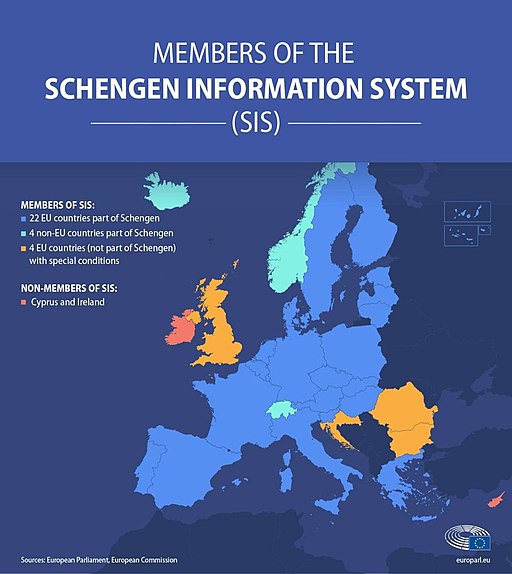It remains to be seen how the ETIAS will affect the Schengen Area and its functioning. However, it is important to note that the ETIAS is a visa waiver system and not a visa.
The ETIAS (European Travel Information and Authorization System) is a new electronic visa waiver system that will be implemented by the European Union (EU) in the near future. It is designed to enhance border security and reduce the risk of terrorism, crime, and illegal immigration within the EU.
The legal basis for the ETIAS is the Regulation (EU) 2018/1240 of the European Parliament and of the Council, which was adopted on 12/08/2018. The ETIAS will apply to third-country nationals who are not required to obtain a visa in order to enter the EU for short stays (up to 90 days) for tourism, business, or transit purposes.
Who will be required to obtain an ETIAS?
Third-country nationals who are exempt from the visa requirement for short stays in the EU will be required to obtain an ETIAS Europe before traveling to the EU. This includes citizens of the following countries:
- Albania
- Andorra
- Antigua and Barbuda
- Argentina
- Australia
- Bahamas
- Barbados
- Bosnia and Herzegovina
- Brazil
- Brunei
- Canada
- Chile
- Colombia
- Costa Rica
- Dominica
- El Salvador
- Georgia
- Grenada
- Guatemala
- Honduras
- Israel
- Japan
- Kosovo
- Malaysia
- Marshall Islands
- Mauritius
- Mexico
- Micronesia
- Moldova
- Monaco
- Montenegro
- New Zealand
- Nicaragua
- North Macedonia
- Panama
- Paraguay
- Peru
- Saint Kitts and Nevis
- Saint Lucia
- Saint Vincent and the Grenadines
- Samoa
- San Marino
- Serbia
- Seychelles
- Singapore
- Solomon Islands
- South Korea
- Taiwan (passports issued by the Ministry of Foreign Affairs in Taiwan that contain an identity card number)
- Timor-Leste
- Tonga
- Trinidad and Tobago
- Tuvalu
- Ukraine
- United Arab Emirates
- United States of America
- Uruguay
- Vanuatu
- Vatican City
Rights and obligations of ETIAS holders
ETIAS holders will have the right to travel to the EU for short stays (up to 90 days) for tourism, business, or transit purposes. They will also have the right to move freely within the Schengen Area, which comprises 26 EU countries (22 EU Member States and 4 non-EU countries) that have abolished passport and other types of border controls at their mutual borders.
However, ETIAS holders will have certain obligations, including:
- Respecting the laws and regulations of the EU Member States they visit
- Notifying the authorities of any change in personal circumstances that may affect their ETIAS authorization (e.g. change of name, nationality, passport)
- Notifying the authorities if they lose their passport or ETIAS authorization
- Leaving the EU before the end of the authorized stay
Refusal, revocation, and invalidation of ETIAS
- The ETIAS may be refused if the applicant poses a threat to public policy, security, or health, or if the applicant has provided false or incomplete information on the ETIAS application.
- The ETIAS may be revoked if the circumstances that led to the granting of the ETIAS no longer apply or if the holder poses a new threat to public policy, security, or health. The ETIAS may also be invalidated if the passport on which it is linked expires or is lost or stolen.
- In the event of a refusal, revocation, or invalidation of the ETIAS, the holder will be informed of the decision and the reasons for it and will have the right to appeal the decision to the competent authorities. The holder will also have the right to be represented by a lawyer or another representative in the appeal process.
The impact of ETIAS on borderless travel in Schengen Area

Each year, millions of travelers from around the world use the Schengen visa to visit the EU for tourism, business, or other purposes. In 2020, a total of 20.3 million Schengen visas were issued by the EU Member States, an increase of 1.4% compared to 2019. The top 5 countries of citizenship of Schengen visa applicants were Russia, Ukraine, China, India, and Turkey.
The implementation of the ETIAS has raised concerns about its potential impact on the border-free Schengen Area, which comprises 26 EU countries that have abolished passport and other types of border controls at their mutual borders. The Schengen Area is one of the most important achievements of the EU, as it allows for free movement of people within its borders, promotes economic and cultural exchange, and enhances cooperation between law enforcement agencies.
Independent voices have argued that the ETIAS may undermine the principles of the Schengen Area by reintroducing border controls and requiring travelers to obtain an authorization before entering the EU. They also argued that the ETIAS will not necessarily increase the security of the Schengen Area, but limit borderless travel of millions of Schengen tourists each year. A significant increase in border control and waiting times can be anticipated.
The advantage of such a law needs to be closely observed and compared to the disadvantages for all travelers that require to participate in the new visa-waiver program.
Conclusion
It remains to be seen how the ETIAS will affect the Schengen Area and its functioning. However, it is important to note that the ETIAS is a visa waiver system and not a visa, and that it will only apply to third-country nationals who are already exempt from the visa requirement for short stays in the EU. The ETIAS will not change the visa requirements for third-country nationals who are required to obtain a visa before traveling to the EU.


Join the conversation!